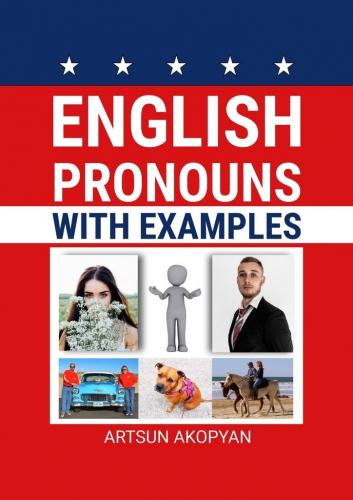Artsun Akopyan
© Artsun Akopyan, 2019
ISBN 978-5-0050-6992-4
Created with Ridero smart publishing system
Foreword
This book is for learners of English as a second language (ESL) / English as a foreign language (EFL). It contains all of the pronouns that are used in spoken English. You will learn how to use pronouns through examples, illustrations and exercises, rather than theory.
All of the images used in this book are released under the Pixabay License / Creative Commons Zero (CC0) license.
What is a Pronoun?
Pronouns are words used instead of nouns and noun phrases.
For example, I, you, he, she, himself, herself, this, that, who, whose, someone, and so on.
I, you, he/she/it, we, you, they
The words I, you, he, she, it, we, you, and they are personal subject pronouns.
I am
Translate in writing:
I – _________________________
man – ______________________
woman – ____________________
am – ________________________
a (an) – ______________________
Study the examples:
I am a man.
I am a woman.
You are
Translate in writing:
you – _________________________
boy – _________________________
girl – _________________________
child – ________________________
are – _________________________
not – _________________________
too – _________________________
Study the examples:
You are a boy.
You are not a man.
You are a child.
You are a girl.
You are not a woman.
You are a child, too.
He / she is
Translate in writing:
he – _________________________
she – _________________________
old – _________________________
old man – _____________________
old woman – __________________
is – _________________________
Study the examples:
He is an old man.
He is not a boy.
He is not a child.
She is an old woman.
She is not a girl.
She is not a child.
It is
Translate in writing:
it – _________________________
milk – _______________________
bottle – ______________________
milk bottle – __________________
cat – ________________________
baby – _______________________
Study the examples:
It is milk.
It is a bottle.
It is a milk bottle.
It is a cat.
It is a baby.
We are
Translate in writing:
we – _________________________
young – ______________________
men – ________________________
young men – ___________________
women – ______________________
young women – _________________
Study the examples:
We are men.
We are young men.
We are not old men.
We are women.
We are young women.
We are not old women.
You are
Translate in writing:
you – _________________________
boys – ________________________
girls – _________________________
children – _____________________
and – _________________________
Study the examples:
You are boys.
You are girls.
You are boys and girls.
You are children.
You are not men and women.
They are
Translate in writing:
they – _________________________
people – _______________________
Study the examples:
They
